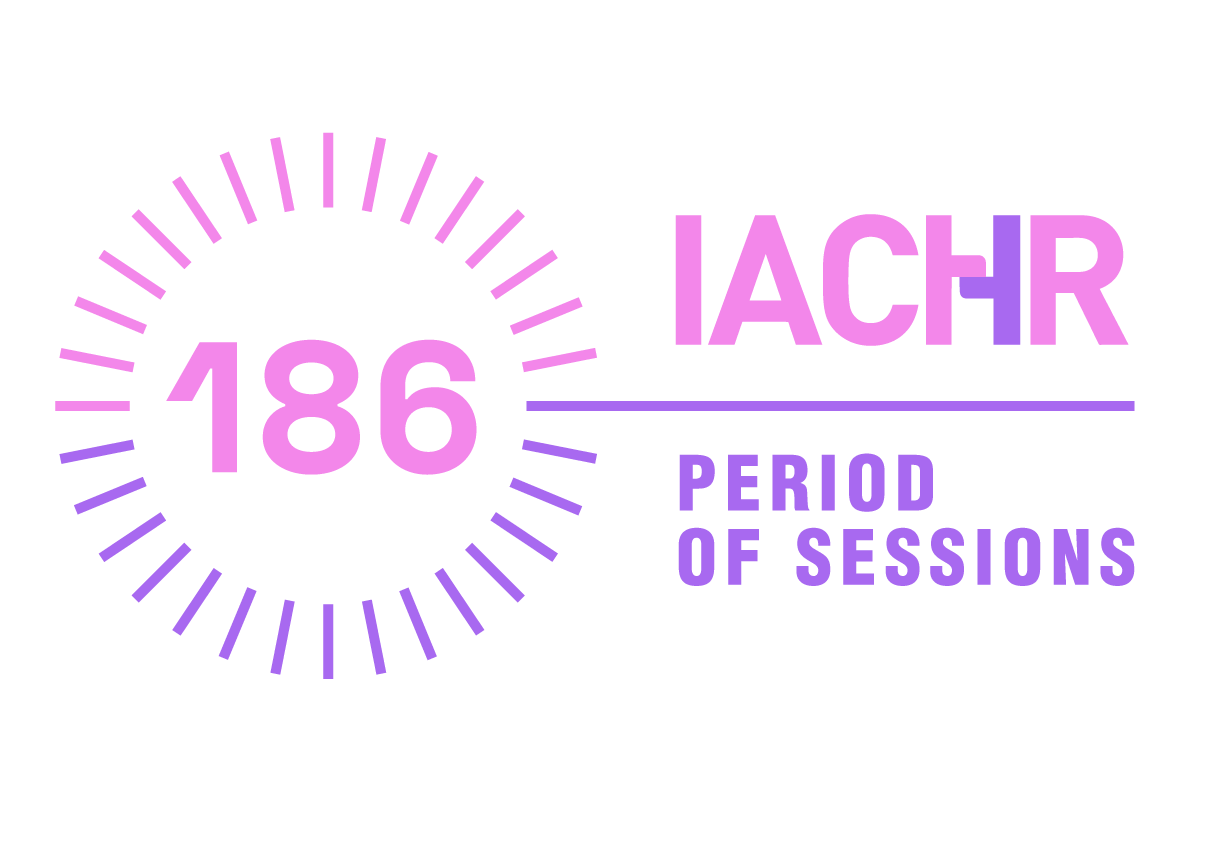
IACHR Public Hearing on Widespread Sexual Violence Against Women and Girls in Haiti
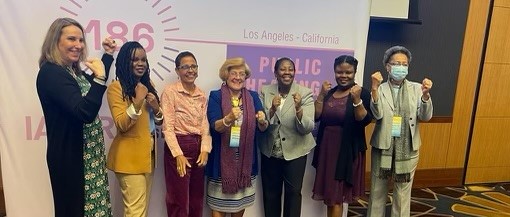
On International Women’s Day, March 8, 2023, the Inter-American Commission on Human Rights (IACHR or Commission) held a hearing on the widespread sexual violence directed against women and girls in Haiti. The Commission called this public hearing in response to a joint request by the BAI; IJDH; Komisyon Fanm Viktim pou Viktim (KOFAVIV); Nègès Mawon; Réseau National de Défense des Droits Humains (RNDDH); the Haitian Women’s Collective (HWC); the Center for Gender & Refugee Studies (CGRS); the Human Rights and Gender Justice Clinic at CUNY School of Law; and MADRE.
Petitioners requested this hearing to address the widespread sexual violence directed at women and girls in Haiti, which has become a deliberate tool deployed by gangs to disrupt Haiti’s social fabric. Such violence takes place against the background of an acute governance crisis, which must be addressed if Haiti is to have any hope of meeting its obligations to protect women and realize all other human rights of Haitians. It is also an extension of a broader pattern of discrimination, exclusion, and gender-based violence that reflects and is driven by women’s unequal status in Haitian society and corresponding institutionalized discrimination, which jointly further reflect the legacies of slavery and colonialism.
Collectively, these are gross violations of the rights of Haitian women and girls as recognized by the Inter-American system and require urgent corrective action, including effective prevention of and remedy for gender-based violence; centering the specific needs of women and girls in all policies, programs, and institutions; and ensuring the equal participation of women and girls in decision-making and governing.
WRITTEN AND VIDEO SUBMISSIONS
- Joint Request for Thematic Hearing, December 12, 2022 (EN)
- Summary of Expected Civil Society Presentation (EN)
- The Fight for Justice for Women and Girls in Haiti – Video presentation by BAI attorneys (KR with EN subtitles)
- Civil Society Recommendations to the Commission (EN)
- Combined Prepared Remarks by Civil Society to the Commission (EN/FR)
- Comprehensive Written Submission, including recommendations from civil society and appendices of key documents, including an annotated bibliography of additional resources (EN)
HEARING PARTICIPANTS
Civil Society Briefers
The below individuals offered testimony to the Commission at the hearing (in speaking order):
- Carine Jocelyn, HWC (prepared remarks – EN)
- Rosy Auguste Ducena, RNDDH (prepared remarks – FR)
- Yvon Janvier, École Supérieure Catholique de Droit de Jérémie (prepared remarks – FR)
- Lucia D. Pascale Solages, Nègès Mawon (prepared remarks – FR)
Representatives of the BAI and KOFAVIV were unable to attend in person and the IACHR did not offer an option for remote participation by civil society. The BAI submitted a video presentation (EN transcript). KOFAVIV submitted written testimony (EN).
Petitioners IJDH and CGRS were present at the hearing.
Representatives for the Government of Haiti
Representatives of the de facto government of Haiti participated in the hearing remotely. The option of participating remotely was not made available to civil society. Speakers included Jean Fallieres Bazelais (Ministry of Justice and Public Security) and Leon Charles (Haitian Ambassador to the Organization of American States).
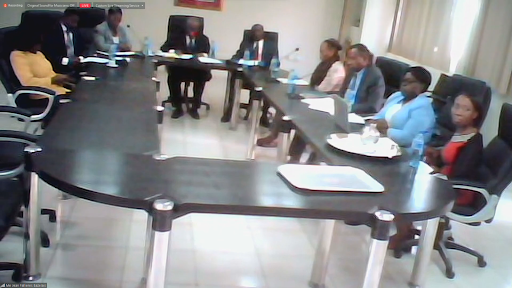
Representative for the United Nations
Aimé Ntumba Kakolo, the deputy of the representative of the Office of the United Nations High Commissioner for Human Rights (OHCHR) in Haiti, appeared via video recording.
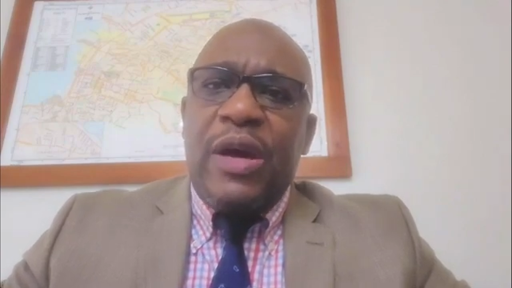
IACHR
A four-member panel of IACHR Commissioners presided over the hearing. The Commissioners offered comments and observations and posed questions to participants.
- Commissioner Esmeralda Arosemena de Troitiño (IACHR President and Rapporteur on the Rights of the Child)
- Commissioner Julissa Mantilla Falcón (IACHR Rapporteur on the Rights of Women)
- Commissioner Edgar Stuardo Ralón Orellana (IACHR Rapporteur for Haiti)
- Commissioner Roberta Clarke (IACHR Rapporteur on the Rights of LGBTI Persons)
Tania Reneaum Panszi, Executive Secretary, and Maria Claudia Pulido, Associate Executive Secretary for Monitoring, Promotion and Technical Cooperation, were also present on behalf of the IACHR and offered remarks.
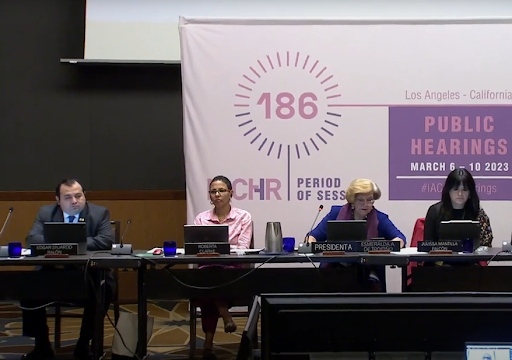
REPORT ON HEARING
During the hearing, civil society briefers shared with the Commission details about the situation of women and girls in Haiti, including high rates of violence and the structural failures that leave them without protections or access to recourse. Briefers particularly emphasized how chronic impunity and corruption prevent access to justice and fuel violence directed at women and girls. All of these issues flow from the governance crisis precipitated by Haiti’s corrupt, undemocratic government irresponsibly supported by the international community. Both the Commission and representatives from the de facto government of Haiti, who participated remotely via Zoom, acknowledged the gravity of the situation facing women and girls in Haiti and the urgent need to act. The IACHR Executive Secretary pointedly urged the de facto government to invite a fact-finding visit to Haiti, which the government representatives appeared to support.
It should be noted that the IACHR did not offer an option for remote participation to representatives of civil society briefers BAI and KOFAVIV, who were unable to attend in person. The IACHR had also committed to providing interpretation into English, Spanish, and Haitian Creole – the latter in response to concerted lobbying from civil society – but interpretation was highly disrupted, making it difficult for both in-person and online participants to understand many of the speakers. These challenges are emblematic of the IACHR’s broader failure to ensure language justice and to facilitate participation by marginalized communities and Haitians specifically.
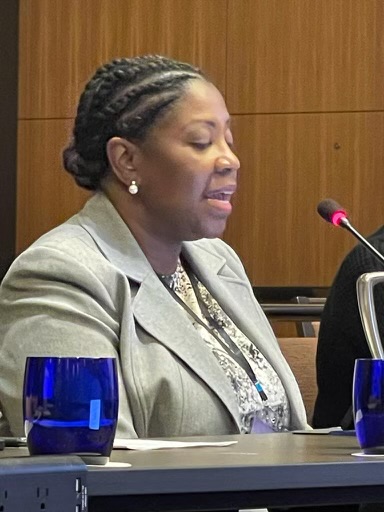
Carine Jocelyn (HWC), reflected on the ongoing crisis in Haiti, which is marked by daily gang violence and an absence of justice and human rights. Women are increasingly vulnerable to sexual and gender-based violence and face systemic discrimination, exclusion from participation in decision-making and leadership, limited access to healthcare and education, and an absence of economic opportunities. Ms. Jocelyn argued that in the short term, there is a need to reduce harm by stopping gun trafficking and ensuring women’s access to humanitarian assistance, protection, and a functioning justice system. In the long term, she emphasized that institutions such as the IACHR should engage with diverse Haitian women to identify solutions to the violence and build on the established women’s and girls’ movement in Haiti.
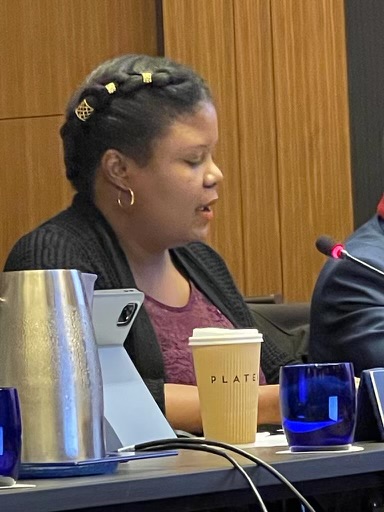
Rosy Auguste Ducena (RNDDH) described the severe sexual and gender-based violence to which women and girls are subject in Haiti, in direct violation of their rights to life, liberty, security, and integrity as established in the American Declaration of Human Rights and Duties of Man. She noted in particular the state’s failure to provide women and girls adequate access to basic social services including education, health, and decent housing, particularly in poor, gang-controlled neighborhoods and rural areas. Ms. Auguste recommended that the Haitian state take action to strengthen the capacity of the Haitian police to reduce generalized insecurity and protect women and girls; investigate the massive human rights violations perpetrated continuously in Haiti; and reduce illegal and arbitrary pre-trial detention of women and girls. Ms. Auguste also requested an on-site visit by the Commission to learn more about the challenging human rights situation in Haiti, with a particular emphasis on the situation of incarcerated women and girls.
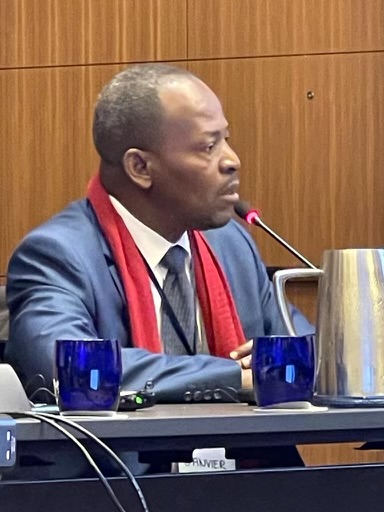
Yvon Janvier (École Supérieure Catholique de Droit de Jérémie) noted that Haiti has one of the highest rates of gender-based violence in the world. He also blamed pervasive stigma and discrimination, economic marginalization, and the weak and corrupt judicial system, which creates a culture of impunity and fuels violence.
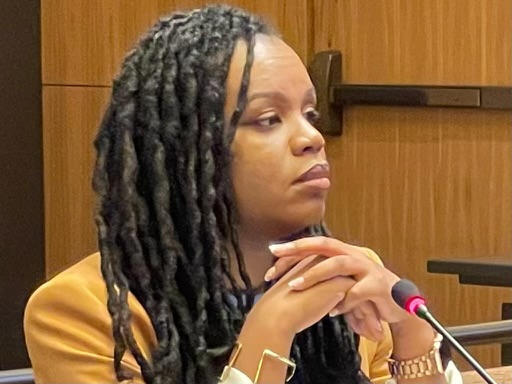
Lucia D. Pascale Solages (Nègès Mawon) attributed women’s and girls’ suffering to anti-feminist policies, poor governance, weakened institutions, corruption, and impunity – and the international community’s persistent support for Haitian leaders who perpetuate these structures. Ms. Solages further argued that Haitian women are disproportionately affected by the current economic crisis, which has restricted their ability to generate income and further limited their access to essential services. Ms. Solages called for urgent action from both the Haitian government and the Commission to address these issues, including a visit by the Special Rapporteur on Gender-Based Violence to Haiti; an investigation into violence against women in Haiti; and expansion of protective measures for Haitian women.
Representatives for the de facto Government of Haiti appeared via Zoom. The representatives acknowledged the scale and nature of the harms as described by the civil society briefers. However, they grossly overstated how much the government has done to protect Haitian women and girls and failed to take responsibility for the government failures identified by the civil society briefers. The representatives further made a number of promises relating to the situation of women and girls in Haiti, including to develop policies for gender equality and a national action plan for ensuring access to healthcare and justice; reform the prison system; and create a judicial cell composed of majority women to oversee cases related to sexual violence. The Commission must hold the Government of Haiti to these promises.
In a pre-recorded video, OHCHR representative Aimé Ntumba Kakolo expressed concerns about the situation of socially vulnerable people in Haiti, which he assessed is largely due to a combination of outdated and discriminatory policies and practices, insecurity, and weak institutions. Mr. Kakolo called on Haitian authorities to take measures to address sexual violence and protect vulnerable populations, and emphasized the UN’s commitment to support those efforts and work towards a safer future for all Haitians.
The IACHR Commissioners expressed solidarity for the people of Haiti, acknowledged the severity of the present crises, and validated the observations shared by the civil society briefers. They further expressed support for civil society recommendations and emphasized the need for more action by the Government of Haiti, the IACHR, and the international community more broadly. Commissioner Ralón Orellana, the current IACHR Rapporteur on Haiti, called for the state to take immediate measures to protect women and girls from violence and combat devastating insecurity. Commissioner Mantilla Falcón further called on the Government of Haiti to declare a state of emergency in connection with sexual violence, and Commissioner Clarke explicitly asked the de facto government representatives for a comprehensive plan for investigating and addressing the issues identified by the briefers.
IACHR Executive Secretary Panszi then requested an in-country visit, noting that an invitation from the Haitian government would be necessary. Associate Executive Secretary for Monitoring, Promotion and Technical Cooperation Pulido also acknowledged civil society critique that the IACHR’s most recent report lacked any material discussion of sexual violence. Finally, Commissioner Troitiño emphasized the impact of Haiti’s crisis on children and questioned whether there are sufficient specialized structures for their protection.
Civil society briefers and the representatives of the de facto government were given an opportunity to respond to the Commissioners’ comments. Ms. Ducena, speaking on behalf of civil society presenters, re-emphasized that violence against women and girls is driven largely by impunity for gangs, who enjoy the protection and support of the de facto government. The solution to Haiti’s crisis, she said, involves strengthening the Haitian National Police’s capacity to confront gang violence, not putting foreign boots on the ground that will only entrench the current regime’s illegitimate power. The de facto government representatives acknowledged the need for action and expressed support for an IACHR mission to Haiti.
HEARING RECORDINGS
A recording of the first 47 minutes of the hearing in the original languages spoken is provided by the IACHR; the IACHR does not provide recordings of its proceedings with interpretation.
The recordings below were made by IJDH from the interpretation streams provided by IACHR. The quality is low, reflecting significant interpretation issues experienced by both in-person and online participants and indicative of the Commission’s failure to prioritize language justice.
ACCOMPANYING SIDE EVENT:
Human Rights for Haiti’s Women and Girls – Haitian Advocates Chart a Path Forward
Following the formal hearing, Petitioners and partners hosted a panel discussion for the public to learn more about the situation of women and girls in Haiti as well as the broader intersecting challenges facing the country. IJDH Senior Staff Attorney Sasha Filippova introduced moderator Carine Jocelyn and representatives from several leading Haitian-based and Haitian-led human rights organizations – Rosy Auguste Ducena, Yvon Janvier, Guerline Jozef of the Haitian Bridge Alliance, and Pascale Solages. BAI lawyers Marie Kattia Dorestant-Lefruy and Gladys Thermezi also participated via pre-recorded video.
The panelists discussed their observations on the hearing as well as conditions for Haitian women and efforts toward supporting survivors and developing pathways to a more just future. They highlighted major problems with the Haitian justice system driving both generalized violence and gender-based violence, including corruption and politicization of the judiciary, and insecurity preventing judicial function and access to courts. These problems have resulted in chronic impunity, sky-high rates of pretrial detention in inhumane prison conditions, and increased migration from Haiti, as people flee to search for livelihoods. The panelists further noted the lack of support from and action taken by the international community to address these issues, which are a product of both internal and external violence, including decades of problematic foreign interference and the Haitian government’s unwillingness to take the necessary measures to protect women and girls. Panelists emphasized above all the need for Haitian-led solutions to the insecurity and governance crises, rather than continued international interference.
Recording of the side event by IJDH available here and by The Promise Institute for Human Rights, UCLA School of Law here (EN/KR, with EN interpretation).
Media advisory with additional information.
MEDIA AND RECENT DEVELOPMENTS
- Summaries of Public Hearings, IACHR, Mar. 23, 2023 (summary of the IACHR Public Hearing on Widespread Sexual Violence Against Women and Girls in Haiti appears on page 4)
- UN urges action in Haiti displacement crisis caused by gang wars, Reuters, Mar. 21, 2023
- Police, women in the crosshairs of Haiti’s spiralling violence, The New Humanitarian, Mar. 10, 2023 (including an interview with civil society briefers Rosy Auguste Ducena and Lucia D. Pascale Solages)
- ‘Intolerable risks’: Haiti’s escalating violence, including sexual attacks, shuts hospital, Jacqueline Charles, Miami Herald, Mar. 8, 2023
What is the IACHR?
The Inter-American Commission on Human Rights is a principal and autonomous organ of the Organization of American States (“OAS”) whose mission is to promote and protect human rights in the American hemisphere. Haiti has been a member state since the OAS’s beginning and ratified the American Convention on Human Rights in 1977.
##
